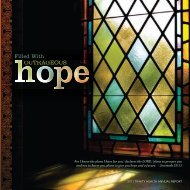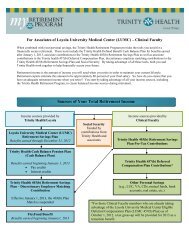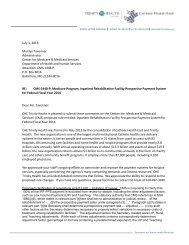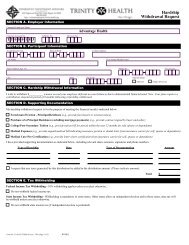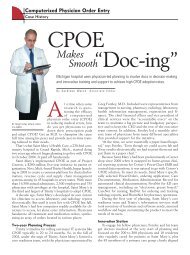Trinity Health Annual Report 2008
Trinity Health Annual Report 2008
Trinity Health Annual Report 2008
You also want an ePaper? Increase the reach of your titles
YUMPU automatically turns print PDFs into web optimized ePapers that Google loves.
“Would you recommend this facility to your family and friends?” With this in mind, <strong>Trinity</strong> <strong>Health</strong> rates<br />
customer satisfaction in three areas:<br />
Respect: I was treated with care, compassion and respect.<br />
Responsiveness: My needs (including pain management) were responded to in a timely fashion.<br />
Understanding: I understood what was happening to me and why – and I was involved in the decision.<br />
It takes everyone at <strong>Trinity</strong> <strong>Health</strong> to create excellence in the care experience for any person who visits our facilities.<br />
ADVANCING PALLIATIVE CARE<br />
When patients face serious chronic or life-threatening illness, they need relief from pain, symptoms and stress.<br />
They and their families need to better understand their condition and choices for care. They need to improve<br />
their ability to tolerate chosen medical treatments. And most importantly, they need the ability to carry on<br />
with everyday life or prepare well for the end of life. Interdisciplinary palliative care serves these needs.<br />
In fiscal <strong>2008</strong>, <strong>Trinity</strong> <strong>Health</strong> recognized the contribution that palliative care makes to the patient care<br />
experience. A new palliative care function led by Sister Gretchen Elliott, RSM, was created to ensure<br />
every Ministry Organization has a defined program in place by 2009. Sister Elliott is the chair of the<br />
national Palliative Care Organization.<br />
Of the many palliative care programs in place across <strong>Trinity</strong> <strong>Health</strong>, three organizations operate nationally<br />
recognized programs:<br />
Mercy Medical Center – North Iowa, Mason City, Iowa: Since launching a palliative care program in 2006,<br />
Mercy Medical Center – North Iowa, has helped hundreds of patients by relieving suffering and enhancing<br />
their quality of life. David Wensel, DO, and Anne Zook, RN, Palliative Medicine Coordinator, run the<br />
palliative care program for both inpatient and outpatient candidates. MMC-North Iowa’s W. David Clark,<br />
MD, also initiated one of only 30 palliative care fellowships for physicians available nationally. It is the<br />
only community hospital-based accredited palliative medicine fellowship in the United States.<br />
Mount Carmel <strong>Health</strong> System, Columbus, Ohio: Mount Carmel <strong>Health</strong> System is one of six designated<br />
Palliative Care Leadership Centers in the United States and has helped nearly 120 teams, several<br />
from affiliated <strong>Trinity</strong> <strong>Health</strong> hospitals, learn about best practices in palliative care programs. Since the<br />
program’s inception in 1997, Mount Carmel has served 14,000 patients and families. Mary Ann Gill, RN,<br />
is the program’s Executive Director and Founding Director of the hospice and palliative care programs.<br />
Phil Santa Emma, MD, serves as Medical Director.<br />
St. Joseph Mercy Oakland, Pontiac, Michigan: Making palliative care part of the culture at St. Joseph<br />
Mercy Oakland has been an ongoing commitment since the hospital first launched Mercy Supportive Care<br />
in 2000. The program received the prestigious Circle of Life Award in 2006 from the American Hospital<br />
Association. Led jointly by Peg Nelson, RN, and Ken Richter, MD, the program offers an intensive training<br />
program for staff, plus continuing education in pain management, palliative care and ethics education.<br />
Rita Garrett and daughter Savannah with Carole Conners, RN, Pam<br />
Dziadosz, RN, and Gail Harrison, OB Tech, who helped husband Spc.<br />
Robert Wesley Garrett experience the birth from Iraq.<br />
Soldier in Iraq Hears Firstborn’s Cry<br />
Gail Harrison, an obstetrics technician at Saint Joseph Regional<br />
Medical Center, South Bend, Ind., was surprised to receive calls<br />
half a world away from an anxious U.S. soldier in Iraq whose wife<br />
was about to deliver their first child.<br />
U.S. Army Specialist Robert Wesley Garrett began calling the<br />
hospital every 10 minutes to get the latest update on his wife<br />
Rita’s labor and delivery. “The nurses kept coming in telling me<br />
my husband was on the phone from Iraq,” his wife, Rita Harrison<br />
recalled. “As we were getting closer, I finally had to tell my mom to<br />
tell him I can’t talk – I’m trying to push this baby through.”<br />
While Rita was giving birth, Harrison transferred the phone into the<br />
labor room. A nurse put the phone on the bed and told him what was<br />
going on.<br />
“It was like she was doing a ballgame,” Rita laughed. “‘It’s crowning…<br />
okay, I can see the head…it’s a girl!’”<br />
This not-so-typical delivery was one the Garrett family will cherish<br />
forever. “When I first heard her cry, it really hit home to me that I had<br />
a daughter,” Specialist Garrett said. “It really is the greatest.”<br />
13



